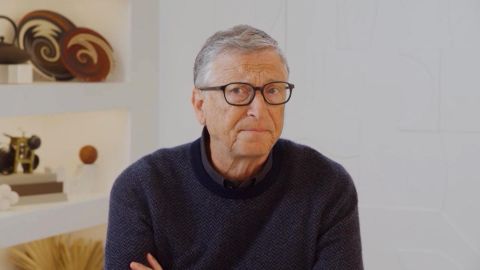Read Transcript EXPAND
CHRISTIANE AMANPOUR: Now, Dr. Anthony Fauci says the U.S. is in a different phase of the pandemic. But there are warnings of the COVID-19 summer surge across the southern states. Looking to learn from the past two years and plan for the future is Bill Gates, with his new book, “How to Prevent the Next Pandemic.” He tell Walter Isaacson why we should treat pandemics like fires.
(BEGIN VIDEOTAPE)
WALTER ISAACSON, HOST: Thank you, Christiane. And Bill Gates, welcome back to the show.
BILL GATES, AUTHOR, “HOW TO PREVENT THE NEXT PANDEMIC”: Great to be here.
ISAACSON: You have this new book out on “How to Prevent the Next Pandemic.” And it begins by saying, hey, we got to learn the lessons from this past pandemic. Let me ask you about a specific lesson. What did we learn from the countries that actually handled this well?
GATES: Well, there weren’t many countries, but a few responded very quickly to scale up the level of diagnostics, and then, they had quarantine policies that were well adhered to. So, Australia stands out, and their death rate is about 10 percent of other rich countries. So, pretty dramatic benefit.
ISAACSON: But if you totally locked down because of people testing positive, make them all quarantine, certainly, that happened in China. But now China is in a total mess because of that.
GATES: Well, China needs to get their vaccination rates of their elderly up to be a lot higher, including probably vaccines that are more effective than the primary ones used in China. You know, eventually, Omicron is going to sweep through China, but they’re trying to delay that while they rushed to do a better job on vaccination.
ISAACSON: But a society like ours that, at least, people have the option to be fully boosted, people like myself, yourself have had the booster shot, even second booster shots, should we still try to quarantine anybody who gets it or is it going to be something like the cold or the flu, you just got over a cold, that gives you a sort of nice immunity and we shouldn’t be trying to shut things down now that people have the options to be vaccinated and boosted?
ISAACSON: Certainly, the combination of getting high levels of boosting and doing a good job of getting the therapeutics out, so that if you test positive, it’s very easy to immediately get the antivirals likes Paxlovid. That should mean we don’t have to make the extreme trade-off of shutting things like schools and businesses down. We should, as you say, treat it as an endemic thing like the flu. The message on boosting needs to be stronger, because clearly, for older people, there is a waning effect. And so, we are starting to see some deaths in vaccinated people, although, still, the majority are the unvaccinated.
ISAACSON: One of the things that struck me when you said the lessons learned from the countries that did it well versus us who didn’t do it well was the correlation with trust in government. Tell me about that and what we can, perhaps, do to improve that metric.
GATES: Well, it be nice to have that, you know, the kind of polarization and conspiracy theories that are out there, kind of tearing that fabric of shared trust. Japan is an outlier, partly because of trust. I think their attitude towards mask-wearing where it’s, you know, for a form of politeness. If you’re going to be near to someone, even before the pandemic, they had a lot of mask-wearing. So, Japan and South Korea, benefited from that. You know, the — a lot of the rich countries are in about the same range as the U.S. The U.S., sadly, didn’t do better, even though before the pandemic, people thought that we would.
ISAACSON: You write in the book, one effect of speaking out is that it has provoked criticisms of the Gates Foundation. That’s actually a sugar-coated way of saying it. You’ve been sort of a target for wackiest of all theories. Why has that come about, and should you be pushing back on those, like the crazy, you know, falsity that you’re putting microchips in people when you do vaccines? How do you pushback on things like that?
GATES: You know, the theories about tracking, you know, as long as they don’t discourage people from getting vaccinated, those almost so bizarre you can laugh. The ones that suggest that vaccines overall are a plots that I or I in partnership with Dr. Fauci or getting rich over and it’s causing more deaths, that’s really tragic because, you know, the world should be very proud of how vaccines are saving lives. You know, we’ve cut the under-five death rate from 10 percent in near 2000 now down below 5 percent. And vaccines are the biggest part of that. You know, so I’m proud of my association with vaccines. I didn’t expect these conspiracy theories.
ISAACSON: You say that people say you are trying to get rich off of these vaccines, or at least, the 1 percent of real wacky people. How much have you actually done the opposite, which is donated and given philanthropic dollars in order to promote vaccines as opposed to gaining some profits from them?
GATES: Yes, the foundation has given over $10 billion for vaccines and $2 billion, specifically, for this pandemic. So, you know, I’m very lucky I have those resources. I have an amazing team, and we were able to jump in, including funding early vaccine manufacturing.
ISAACSON: Should there have been one central database in the United States where you could go to find where to get the vaccine, where we can track in real-time who’s had the disease, whether we contract the correlations of the disease to whether you’ve lived in the place with people wearing masks, those type of things?
GATES: No. It’s tragic that the CDC wasn’t asked by its leadership to have a website where access to diagnostics, access to results, all of the information would have been there, including, you know, where to go and get vaccinated. So, we ended up, you know, kind of state by state, we ended up with the diagnostics, you have a delay to get results. There is no reason you should ever create that backlog, because delays make the test absolutely worthless. So, the — we didn’t practice the idea of getting all that PCR testing behind a CDC website and, you know, that’s a big difference between the U.S. failure and what’s the exemplars managed to achieve.
ISAACSON: The CDC, the Centers of Disease Control, that you’ve just talked about, you used to speak of them out as the golden standard of the world, that they — everyone would come to the United States to figure out how our Centers of Disease Control worked. Why did they fail so badly this time, even on the things that were surprising, like keeping track of data of who got it, who was wearing masks, whether if you ended up testing positive, exactly what vaccines you had, whether you lift in an area, where you could correlate it to mask mandates? It seems we had to use Israeli data or a foreign data in order to figure out whether masks were working or not.
GATES: That’s partly the CDC’s fault. CDC still is the smartest group of epidemiologists, you know, they were involved in smallpox eradication, they’re key to the polio eradication work. They also didn’t keep full-time people on pandemic work and think about the drills and the scenarios. And when big pandemics only come along every, you know, hundred years, it’s easy to get lax. And there’s so much work, you know, they have a limited budget. So, you know, next time, we’ll know better how to scale up those diagnostics. Likewise, we don’t have a health data system. And so, they suffered from the fact that correlating, you know, behavior in an area with health outcomes is much harder in the U.S. than it is, in say, Israel, where they have a common database.
ISAACSON: You talk about the need for that centralized website. In your book, you talk about the fact that you had a really heated phone call with the White House on that issue. I’d love to hear about it. Who was it with and what where they arguing and what were you arguing?
GATES: Well, you know, Secretary Azar who ran HHS at the time has the FDA, NIH, CDC, this group called BARDA, you know, even an undersecretary for emergency response. And we — so, we have more people than any other country to think about these medical things. But there were gaps between the efforts, there wasn’t the practice level. And so, for example, scaling up diagnostics, once they got off where they were not doing it, they didn’t want to backtrack and step up. You know, the Defense Production Act would have let them go out to all of those PCR companies, which the U.S. has way more than anyone else and get rapid diagnostics in place and given us a chance to have substantially less deaths. But, you know, we simply failed to convince them of that. It got confusing. Then there was a task force and then there was Jared, and no willingness to step up and build that key resource.
ISAACSON: Yes. But tell me about the phone call where you really tried to push them into doing things.
GATES: Well, I was fairly stern. You know, I try and do that less now than when I was young to sort of, you know, say, hey, if you don’t do, this it’s pretty dumb. But I thought it was worth raising the, you know, strength of my concern in a pretty direct way. You know, sadly things were quite dysfunctional. You know, that was in a period where they was — you know, Trump had says, hey, it go away without a vaccine. And, you know, they were probably getting calls from lots of people until they just didn’t want to build that website. And so, then we had to build relationships with individual states. Some of which had capacities to do it, but most did not.
ISAACSON: You talk about preparing for the next pandemic. Are you sure the next pandemic is going to be a viral pandemic or it might be bacteria or even fungus or something else and does that change how we have to prepare for it?
GATES: No, that’s super important that we can’t just focus on the last war, so to speak. But it’s very likely to be respiratory virus. You know, when I did the 2015 TED Talk and articles around that, you know, it was about respiratory because that can get out so quickly. You are still healthy and you’re on a plane or a bus. And it could be bacterial, most of those bacterial diseases aren’t as difficult as the viral ones but we need tools there as well. So, the scary thing is that the fatality rate could be 10 times higher than it was this time. And in that sense, we got lucky.
ISAACSON: Biden had a plan for fighting the next pandemic, his science advisers had a lot of money behind it. What happened to the big plan they were going to do for the next pandemic? Is it still possible for the administration to do something like that?
GATES: Well, of course, the government has a lot of issues that’s dealing with. You know, we have to finish this pandemic and we are still worried about different variants and the waning of the vaccine protection. Ukraine is raising massive issues. I have to say, I’m still a bit disappointed that the congressman executive branch aren’t putting more bandwidth into this discussion. I think that this year is the time for that. That discretionary budget recommendation didn’t have this. They did it in kind of an unusual white with the mandatory recommendations. So, I don’t know how seriously the debate will emerge. You know, my book, I hope, will kick off that debate here in the U.S. and around the world and yet, things like this surveillance group, monitoring group, which I call germ, you know, get the funding for that. And they will make us practice on a regular basis, even when there is no pandemic.
ISAACSON: You know, that surveillance group you just talked about, you call it germ in your book, I think you say it already, it goes back to Emperor Augustus who had a permanent team of firefighters. We like to think it was Ben Franklin too who created the first, you know, full-time volunteer fire department to say, all right, we will be out there. What is the connection, the analogy between what we do with firefighting and what we should be doing with the pandemics?
GATES: Yes. So, governments take charge of the safety of citizens against many bad, surprising events. War, you know, meteors, volcanoes. Fire is the one that people can relate to the best because, you know, we are all trained, we all know about it and there’s lots of small fires and that helps us to get ready to make sure you don’t have like citywide fire, like existed in the past. I was surprised that now there’s 300,000, full-time fire people in the United States. And, of course, they are practicing all of the time. And we all know when that alarm goes off, to calmly proceed to the exit. So, the idea that that is the analogy for pandemics, I think that resonates with people far more than just talking about the defense budget or wargames, which are pretty distant from everyday life.
ISAACSON: So, if you are to set up, as you’ve described in your book, a pandemic response team, what would it be like? What would it do?
GATES: Well, it’s got to start at the global level because these outbreaks, you know, they can take place in Asia and Africa. And so, you know, to protect all countries, you have to be constantly seeing are there little outbreaks and apply resources to sequence and understand what that is and then quickly try and avoid it getting to many countries. So, I’m talking about 3,000 people under the W.H.O. So, at the global level, that work with each country. And then, if a country is not practicing, they — the W.H.O., as a group, would complain and says, come on, we all are in this together, and they figure out how to get an overall global cooperation plan.
ISAACSON: How does this all — this pandemic teach you things about and relate to the broader work about health equity that your foundation does?
GATES: Well, predictably, the great pandemic tools got out to the rich countries a lot faster than they did to the developing countries. And particularly, if you look at the elderly people in those poor countries, they should’ve got vaccines before any young people in any country did, because this, overwhelmingly, is a disease of the elderly and that is where the vaccine has this huge impact. You know, that is where, even now, all countries should emphasize coverage and boosting in that part of the population. People were stunned that the vaccines didn’t get out quickly. There were efforts to do that, the U.S., you know, withdrew from W.H.O., the money came late and then, Trump blocked the spending of the international money. And so, Biden had to unlock that. So, there were things that made this one very hard. But, you know, health is inequitable for all diseases. You know, if you are in a developing country, the cancer treatments are not there. And so, if it — if this reminds people that we need to keep reducing that gap, it will be good. You know, we didn’t get the equity on this disease even though it was visible. So that overall cause, you know, it’s been a setback, those countries, their economies, they debts, even though their death rate, because their age structures is a little lower, they’ve suffered overall more than any other countries.
ISAACSON: Bill Gates, thank you so much and it’s good to be with you again.
GATES: Thanks, Walter.
About This Episode EXPAND
A draft Supreme Court ruling overturning the Roe v. Wade abortion decision has been leaked. Carrie Severino claims the draft ruling accomplishes many of her life’s ambitions. Gloria Steinem sees the ruling as a threat not just to women, but to American democracy. Jonathan Powell discusses how to end the war in Ukraine. Bill Gates discusses his new book “How to Prevent the Next Pandemic.”
LEARN MORE


